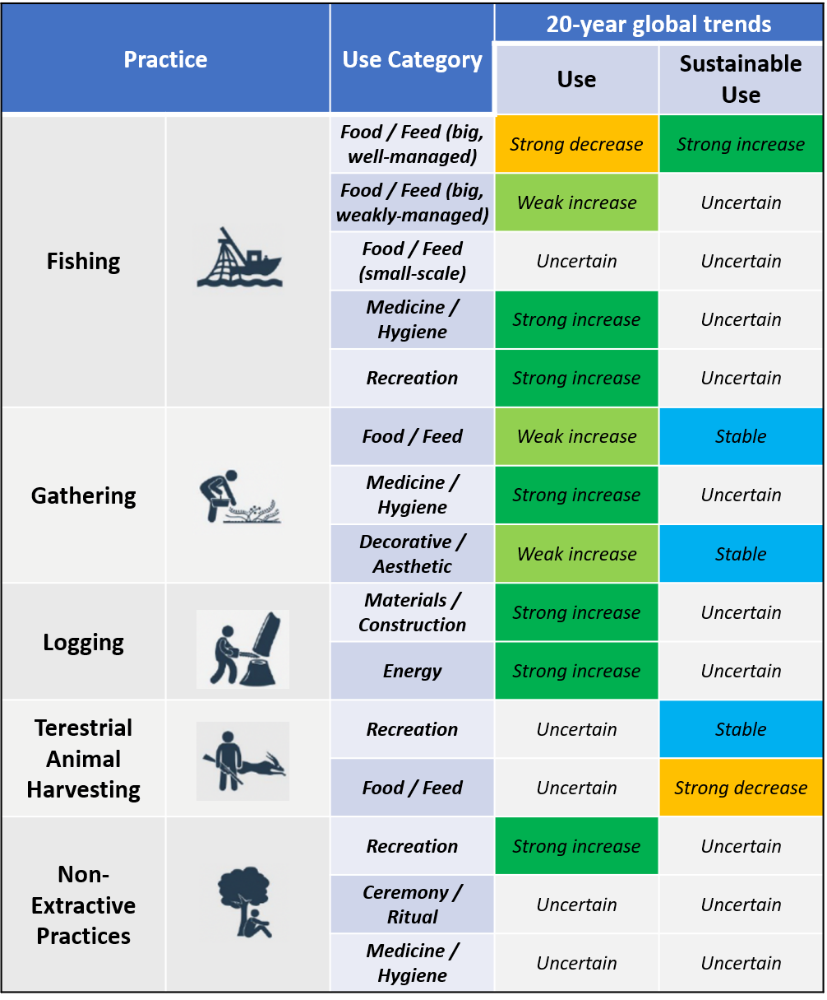
Use of wild species is broadly sustainable for gathering & recreational hunting (by J Mühle from IPBES ASUB)
There are about 8 billion humans in the world. More than one person in three depends on gathering wild plant materials for food and fuel, on fishing and on hunting, mostly in poorer countries. In richer countries, wild species contribute to food variety, health and recreation, while nourishment comes mainly from farming. People everywhere depend on nature for healthy air and water, and hence on healthy ecosystems. Farming is essential to feed the world. However, cultivation must not become so intensive that it damages the ability of ecosystems to keep us healthy.
An assessment by the United Nations has shown that our use of wild species is broadly sustainable for gathering and recreational hunting on land. It is less so when we depend on wild animal species for food, especially where farms and other development convert so much land that ecosystems support less wildlife. The sustainability of some marine fisheries became low, but is improving after a period of excessive use which caused fish stocks to decline. The assessment also showed that sustainable use of wild species has huge unexploited potential to help meet the UN’s Sustainable Development Goals.
Conservation needs local commitment
_1123318475_638177711407340441.jpg)
In a healthy ecosystem, Peruvians herd wild vicuña each year for their valuable wool © Ryan Smith/Shutterstock
When use is sustainable, species are preserved for the future. However, species cannot be preserved without healthy ecosystems. Being able to use wild species is therefore a powerful incentive for communities to conserve species and the ecosystems on which they depend. In richer countries, recreational use of wildlife encourages monitoring of species, habitat restoration, education of citizens, and the science that underpins these activities. Cultural heritage also motivates communities everywhere, so the long-standing knowledge of indigenous people must be cherished and respected. In all cases, local people must be empowered for local conservation actions. Protected areas are known to benefit local fisheries, so sustainable use can benefit from local protection and reserves, but only where communities agree that the management measures, including prohibitions, are appropriate.
Can tourism contribute?
1839104833_638177715055155755.png)
Carefully managed fishing or hunting tourism can pay to conserve large areas © Shutterstock/wwwarjag
Tourism for wildlife-watching can bring income to communities. However, sustainability of tourism is limited by constraints on travel, which may be carbon-intensive. Visitors also place extra pressure on local ecosystems, for example for water. Tourism may be more sustainable ecologically if higher prices can be charged for access to the local resources. Thus, carefully managed fishing or hunting can pay to conserve large areas, provided that local people share in and broadcast widely the benefits to them and their wildlife.
Community-Based Conservation
_298102391_638177716443282177.jpg)
Billions of people who gather and fish and hunt need to conserve the riches of nature on which they depend © Shutterstock/hortimages
Local sustainable use, without travel, supports local awareness of the benefits of nature. It requires those species being used to be abundant and for local people to have ownership of the means to support this abundance, which can promote conservation actions everywhere. The billions of people who gather and fish and hunt need to be encouraged and empowered to conserve the riches of nature on which they depend. They need to monitor and manage their environment, to ensure that change in land for cultivation does not make wild species too rare to harvest. We need to guide such citizen-science and to encourage activities of citizens that help nature, not to block such engagement. Let’s see if the science revolution can undo the harm to nature that has come from the agricultural revolution, factory fishing and other intensive development!